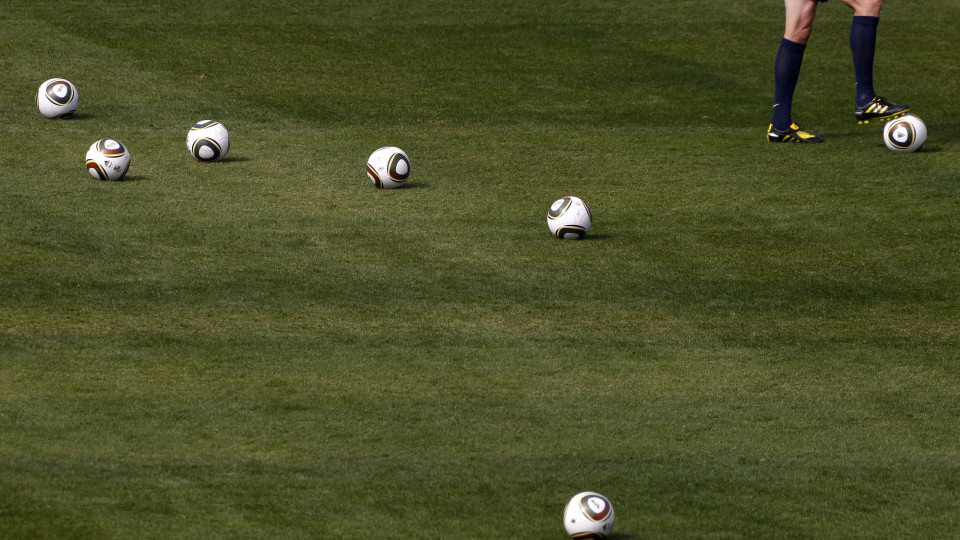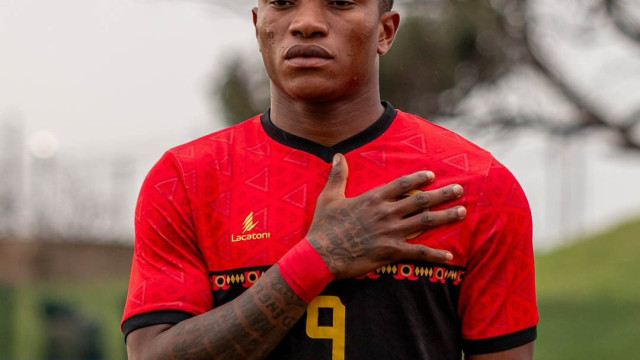25 April: Economic power gradually supported the footballing strength of the North
The footballing emergence of clubs from the north after 25 April 1974 was associated with the growing local wealth, in contrast with the industrial decline on the south bank of the Tagus River, where historical emblems withered away.

© Reuters
Sporting won the first 'double' of the democracy in 1973/74, a season in which eight emblems from the Lisbon Metropolitan Area, three from Greater Porto, two from the Algarve and solitary representatives from the Ave, Aveiro and Coimbra regions played in the I League.
This correlation of forces was resized in the following five decades, with the elite currently including 11 clubs located above the Vouga river - four from the Porto Metropolitan Area, four from Ave, two from Cávado and one from Alto Tâmega - among 18 participants.
Sporting, Benfica, FC Porto, Vitória de Guimarães, Farense and Boavista coincide with 1973/74, while Belenenses and Leixões remain in professional football through the II League.
"The district of Braga now has six clubs in the I League. This presence is closely related to the fact that the cities - especially Guimarães and Braga - have grown a lot economically. Being exporters within and outside the country, they created wealth. This wealth brings people, who, in turn, bring skills and a fan base," analysed Ricardo Serrado.
Of the 72 clubs involved in 90 editions of the I League, 30 made their debut after the fall of the Estado Novo, with 12 being located above the Douro river - with a particular incidence in areas of growing textile industry - against four in Greater Lisbon, where the pre-revolution supremacy between 'neighbours' Benfica and Sporting was overshadowed by FC Porto.
"Clubs follow their own cities very closely. Often, they have to connect with the populations so that there is an identification with the fan. Now, a big club is made up of a mass of fans, who live in big cities. As a country of small cities, Portugal will always be condemned to have few big clubs," he framed.
Ricardo Serrado recalls the 68 trophies accumulated by FC Porto since the first of 15 elections of the current president Pinto da Costa, in 1982 - among which are 23 championships, out of a total of 30, plus seven international successes -, far from the 16 added up until then.
"He is the most successful manager in the history of football and that has had a tremendous impact on FC Porto. Now, there is no basis for saying that the fact that the club has won more titles since 1974 has to do with the new regime. FC Porto starts to win more because it had better internal organisation. It's not for anything else. It had a president who organised, projected and energised the club, making it one of the biggest in Europe," he stressed.
Holder of 40 titles before 25 April, Benfica added another 45 after that date and rose from 20 to 38 the record of achievements in the I League, while Sporting was national champion six times, out of a total of 19, and added 28 of its 54 successes in democracy.
"Afterwards, it seems clear to me that the political and sporting powers were excessively centralised in Lisbon. The creation of the Portuguese Professional Football League (LPFP) in the north [in Porto, in 1978] contributed to a greater distribution of powers and transparency, something that allowed things to be better balanced," explained Ricardo Serrado.
In addition to FC Porto, this northern irruption helped to project Boavista, which joined the three 'big ones' and Belenenses in the quintet of national champions in 2000/01 and is currently the fourth most successful Portuguese club, with nine trophies in the post-revolution period.
Next comes Sporting de Braga, holder of the same seven successes as the 'blues' of Restelo and the main adversary of Benfica, FC Porto and Sporting in the last two decades, while Vitória de Guimarães, Estrela da Amadora, Beira-Mar, Vitória de Setúbal, Académica, Moreirense or Desportivo das Aves also won trophies after 25 April.
This period also brought the projection of the Madeira archipelago, which launched itself in the I League in 1977/78 through Marítimo and played successively in the elite from 1985/86 to 2022/23 - the Azores only made their debut in 1999/00 with Santa Clara -, helping to make Portuguese football a frequent vehicle for the expression of regionalist feelings.
"It is almost a football of the north against another of the south. FC Porto symbolised for many years and still symbolises today the flag of the north against the south," concluded Ricardo Serrado.



Descarregue a nossa App gratuita.
Oitavo ano consecutivo Escolha do Consumidor para Imprensa Online e eleito o produto do ano 2024.
* Estudo da e Netsonda, nov. e dez. 2023 produtodoano- pt.com

Descarregue a nossa App gratuita.
Oitavo ano consecutivo Escolha do Consumidor para Imprensa Online e eleito o produto do ano 2024.
* Estudo da e Netsonda, nov. e dez. 2023 produtodoano- pt.com
Recomendados para si
Classificados Auto
Leia Também










Últimas Notícias











| Clube | J | PTS | |||
|---|---|---|---|---|---|
| 1 | Sporting | 4 | 12 | ||
| 2 | FC Porto | 4 | 9 | ||
| 3 | Vitória SC | 4 | 9 | ||
| 4 | Famalicão | 4 | 9 | ||
| 5 | Santa Clara | 4 | 9 | ||
| 6 | Sp. Braga | 4 | 8 | ||
| 7 | Benfica | 4 | 7 | ||
| 8 | Moreirense | 4 | 7 | ||
| 9 | Rio Ave | 4 | 6 | ||
| 10 | Gil Vicente | 4 | 5 | ||
| 11 | AVS | 4 | 4 | ||
| 12 | C.D. Nacional | 4 | 4 | ||
| 13 | Boavista | 4 | 4 | ||
| 14 | Arouca | 4 | 3 | ||
| 15 | Casa Pia | 4 | 3 | ||
| 16 | Estoril | 4 | 2 | ||
| 17 | Estrela | 4 | 1 | ||
| 18 | Farense | 4 | 0 |
| Clube | J | PTS | |||
|---|---|---|---|---|---|
| 1 | Barcelona | 4 | 12 | ||
| 2 | Real Madrid | 4 | 8 | ||
| 3 | Atlético Madrid | 4 | 8 | ||
| 4 | Villarreal | 4 | 8 | ||
| 5 | Girona | 4 | 7 | ||
| 6 | Alavés | 4 | 7 | ||
| 7 | Osasuna | 4 | 7 | ||
| 8 | Celta Vigo | 4 | 6 | ||
| 9 | Leganés | 4 | 5 | ||
| 10 | Mallorca | 4 | 5 | ||
| 11 | Rayo Vallecano | 4 | 4 | ||
| 12 | Real Sociedad | 4 | 4 | ||
| 13 | Athletic Club | 4 | 4 | ||
| 14 | Espanyol | 4 | 4 | ||
| 15 | Real Valladolid | 4 | 4 | ||
| 16 | Getafe | 3 | 3 | ||
| 17 | Real Betis | 3 | 2 | ||
| 18 | Las Palmas | 4 | 2 | ||
| 19 | Sevilla | 4 | 2 | ||
| 20 | Valencia | 4 | 1 |
| Clube | J | PTS | |||
|---|---|---|---|---|---|
| 1 | Manchester City | 3 | 9 | ||
| 2 | Liverpool | 3 | 9 | ||
| 3 | Brighton & Hove Albion | 3 | 7 | ||
| 4 | Arsenal | 3 | 7 | ||
| 5 | Newcastle United | 3 | 7 | ||
| 6 | Brentford | 3 | 6 | ||
| 7 | Aston Villa | 3 | 6 | ||
| 8 | AFC Bournemouth | 3 | 5 | ||
| 9 | Nottingham Forest | 3 | 5 | ||
| 10 | Tottenham Hotspur | 3 | 4 | ||
| 11 | Chelsea | 3 | 4 | ||
| 12 | Fulham | 3 | 4 | ||
| 13 | West Ham United | 3 | 3 | ||
| 14 | Manchester United | 3 | 3 | ||
| 15 | Leicester City | 3 | 1 | ||
| 16 | Crystal Palace | 3 | 1 | ||
| 17 | Ipswich Town | 3 | 1 | ||
| 18 | Wolverhampton Wanderers | 3 | 1 | ||
| 19 | Southampton | 3 | 0 | ||
| 20 | Everton | 3 | 0 |
| Clube | J | PTS | |||
|---|---|---|---|---|---|
| 1 | Internazionale | 3 | 7 | ||
| 2 | Juventus | 3 | 7 | ||
| 3 | Torino | 3 | 7 | ||
| 4 | Udinese | 3 | 7 | ||
| 5 | Hellas Verona | 3 | 6 | ||
| 6 | Napoli | 3 | 6 | ||
| 7 | Empoli | 3 | 5 | ||
| 8 | Lazio | 3 | 4 | ||
| 9 | Parma | 3 | 4 | ||
| 10 | Genoa | 3 | 4 | ||
| 11 | Fiorentina | 3 | 3 | ||
| 12 | Atalanta | 3 | 3 | ||
| 13 | Lecce | 3 | 3 | ||
| 14 | AC Milan | 3 | 2 | ||
| 15 | Monza | 3 | 2 | ||
| 16 | Cagliari | 3 | 2 | ||
| 17 | AS Roma | 3 | 2 | ||
| 18 | Bologna | 3 | 2 | ||
| 19 | Venezia | 3 | 1 | ||
| 20 | Como | 3 | 1 |
|
Liga Campeões
|
Liga Europa
|
Despromoção
|
|---|
| Jogador | Golos | ||||
|---|---|---|---|---|---|
| 1 | Viktor Gyokeres | 7 | |||
| 2 | Kanya Fujimoto | 3 | |||
| 3 | Marcos Vinicios | 3 | |||
| 4 | Pote | 3 | |||
| 5 | Luís Nlavo | 3 | |||
| 6 | Wenderson Galeno | 3 | |||
| 7 | Ricardo Jorge Oliveira António | 2 | |||
| 8 | Nene | 2 | |||
| 9 | Rodrigo Zalazar | 2 | |||
| 10 | Gabriel Silva | 2 |
| Jogador | Golos | ||||
|---|---|---|---|---|---|
| 1 | Robert Lewandowski | 4 | |||
| 2 | Raphael Dias Belloli | 3 | |||
| 3 | Toni Martínez | 2 | |||
| 4 | Daniel Olmo Carvajal | 2 | |||
| 5 | Ayoze Perez | 2 | |||
| 6 | Borja Iglesias | 2 | |||
| 7 | Juan Cruz | 2 | |||
| 8 | Arnaut Danjuma Groeneveld | 2 | |||
| 9 | Sandro Ramírez | 2 | |||
| 10 | Arnaut Danjuma Groeneveld | 2 |
| Jogador | Golos | ||||
|---|---|---|---|---|---|
| 1 | Erling Braut Haland | 7 | |||
| 2 | Noni Madueke | 3 | |||
| 3 | Luis Díaz | 3 | |||
| 4 | Mohamed Salah | 3 | |||
| 5 | Bryan Mbeumo | 3 | |||
| 6 | Jhon Durán | 2 | |||
| 7 | Nicolas Jackson | 2 | |||
| 8 | Amadou Mvom Onana | 2 | |||
| 9 | Chris Wood | 2 | |||
| 10 | Yoane Wissa | 2 |
| Jogador | Golos | ||||
|---|---|---|---|---|---|
| 1 | Marcus Thuram | 4 | |||
| 2 | Mateo Retegui | 3 | |||
| 3 | Daniel Mosquera | 2 | |||
| 4 | Dennis Man | 2 | |||
| 5 | Marco Brescianini | 2 | |||
| 6 | Dusan Vlahovic | 2 | |||
| 7 | Valentín Castellanos | 2 | |||
| 8 | Emmanuel Gyasi | 2 | |||
| 9 | Romelu Lukaku | 1 | |||
| 10 | Milan Djuric | 1 |
Newsletter
Receba os principais destaques todos os dias no seu email.
Mais lidas
- Última hora
- Dia
- Semana
-
1
-
2
desporto Seleção nacional
-
3
desporto Sporting
Sporting vence Mafra em jogo-treino, mas Amorim ganha 'dor de cabeça'
-
4
desporto Paris'2024
Carolina Duarte conquista a medalha de bronze nos Jogos Paralímpicos
-
5
-
6
desporto Matheus Pereira
Ex-Sporting revela: "Bebia uma cerveja e quando via já estava na décima"
-
7
desporto Mercado de Transferências
Oficial: Pizzi junta-se a treinador português em destino surpreendente
-
8
desporto Jeffrén Suárez
De promessa ao lado de Messi a Alvalade. O que é feito de Jeffrén?
-
9
-
10
desporto Liga das Nações
"Problema com os sogros" e Ronaldo capaz de tudo. Martínez antevê Escócia


Newsletter
Seja o primeiro a saber
Receba os principais destaques todos os dias no seu email.
© 2024 Notícias ao Minuto. Todos os direitos reservados
- Estatuto editorial
- Propriedade intelectual
- Política de privacidade
- Termos & condições
- Ficha técnica
- Contactos
- Equipa












